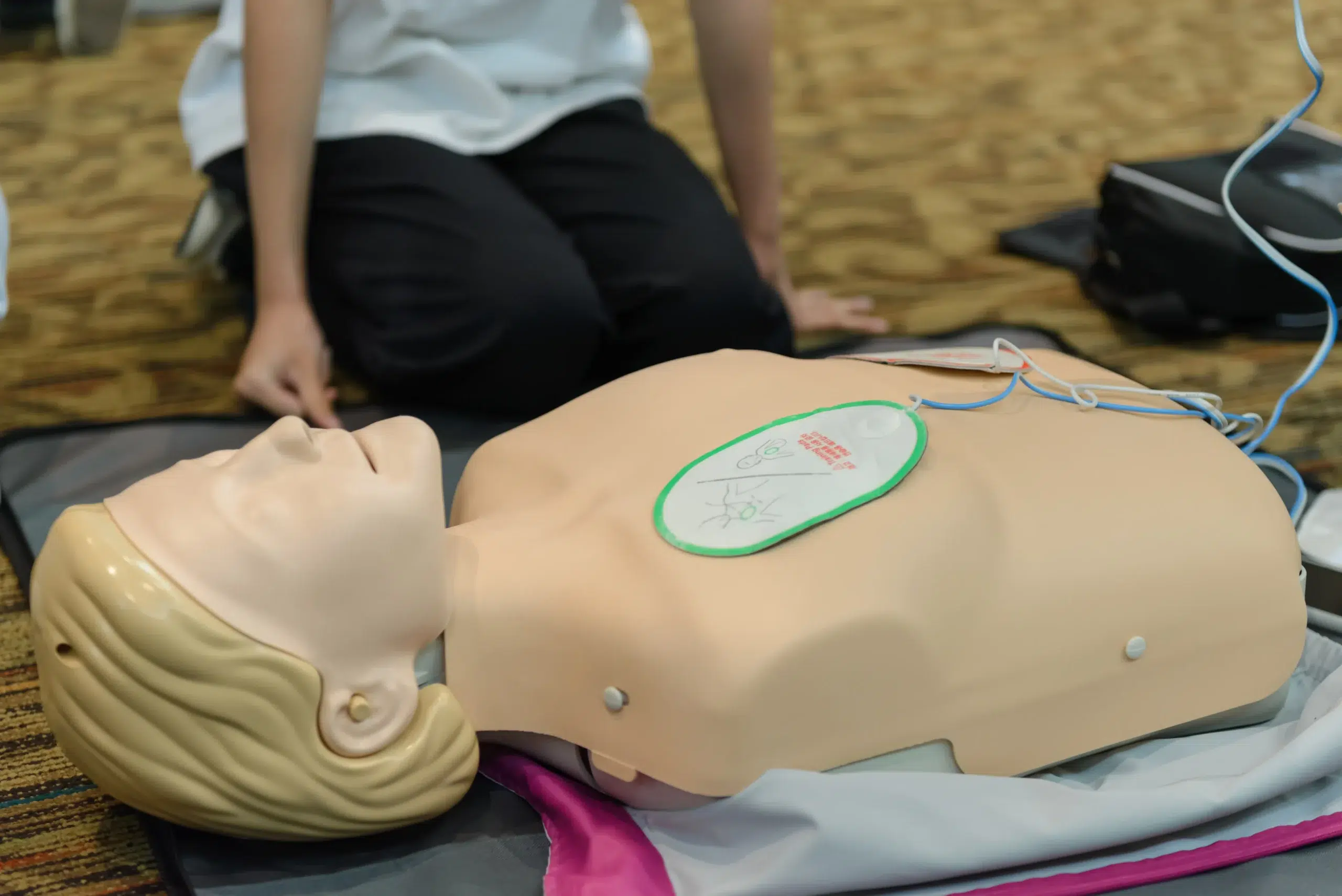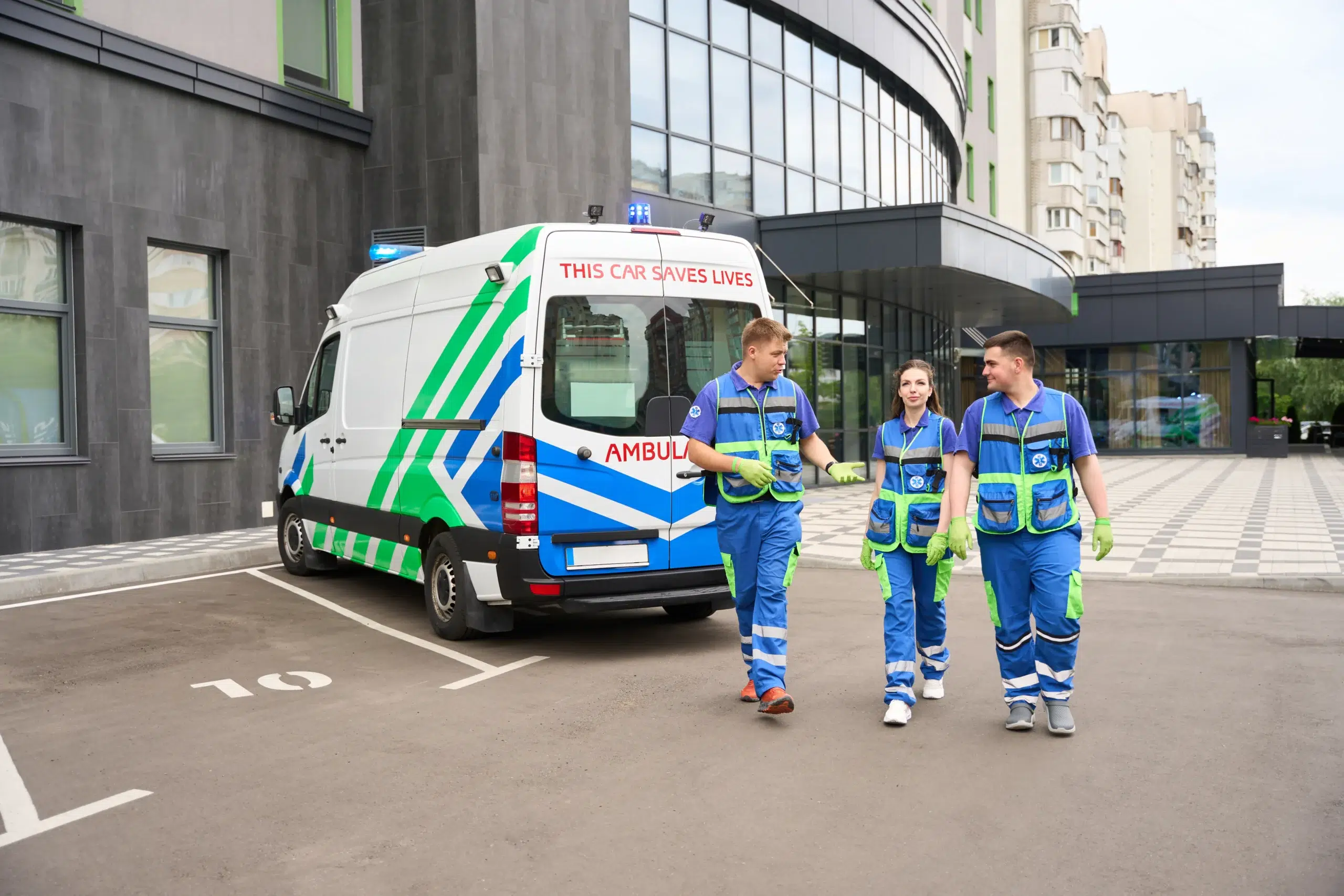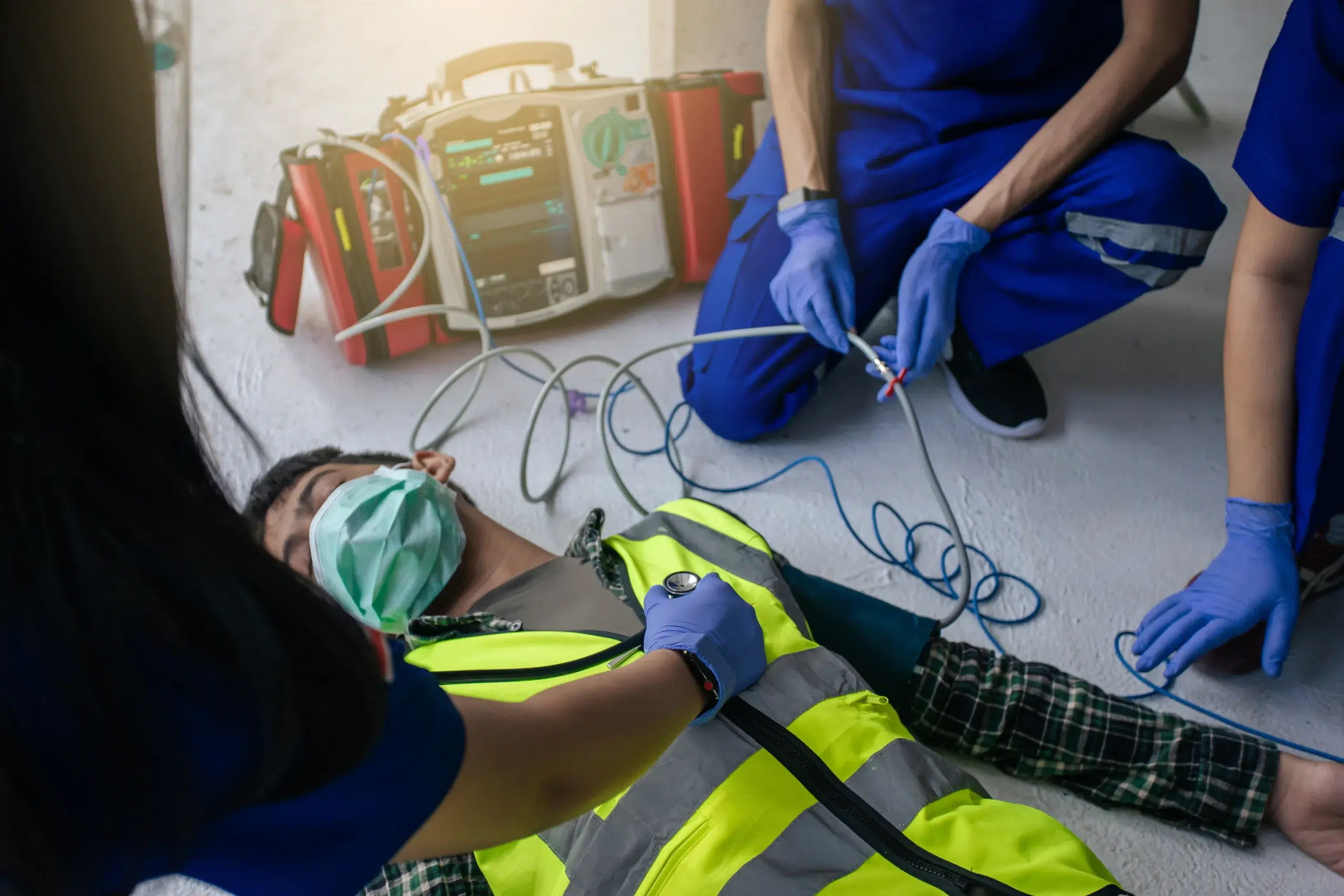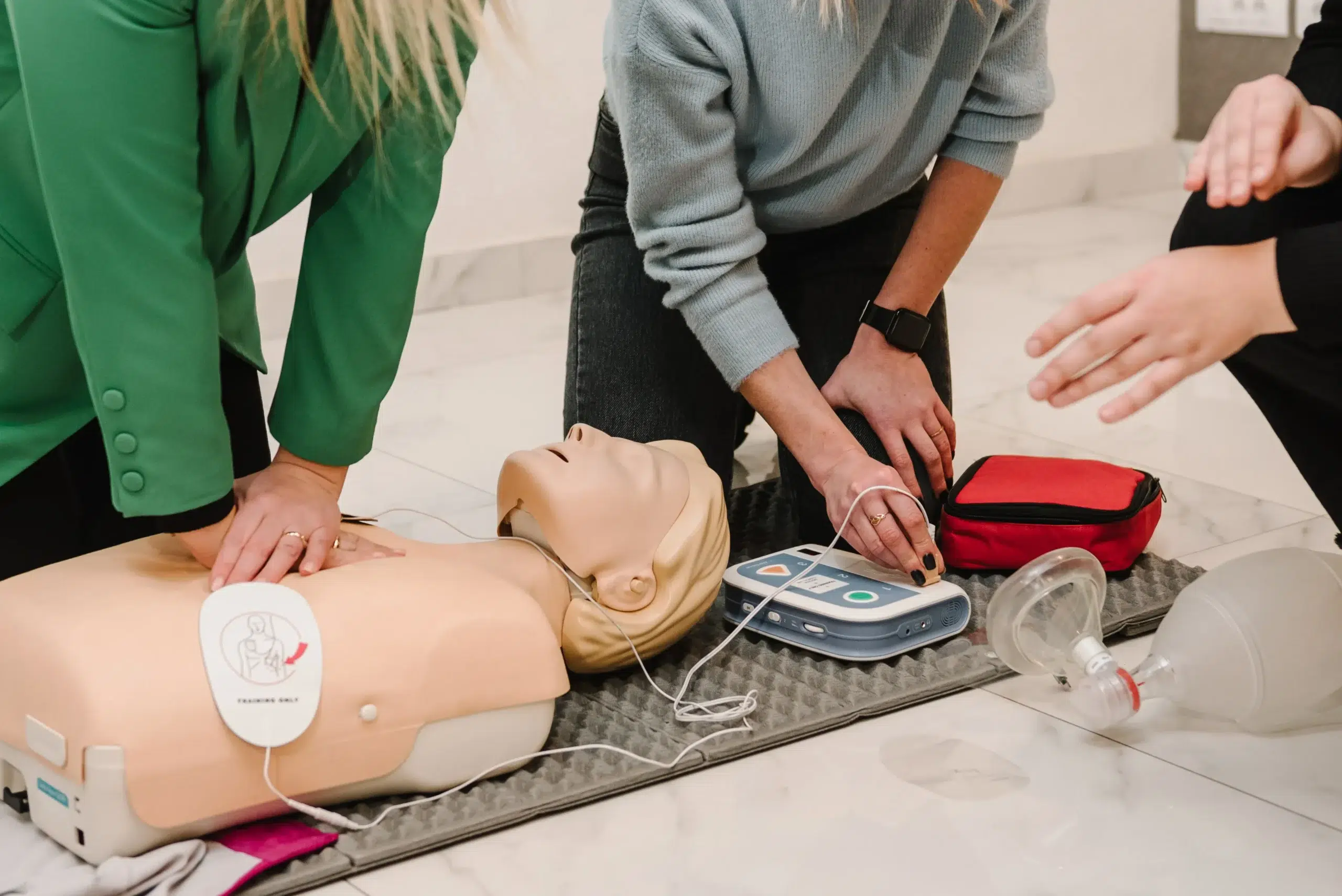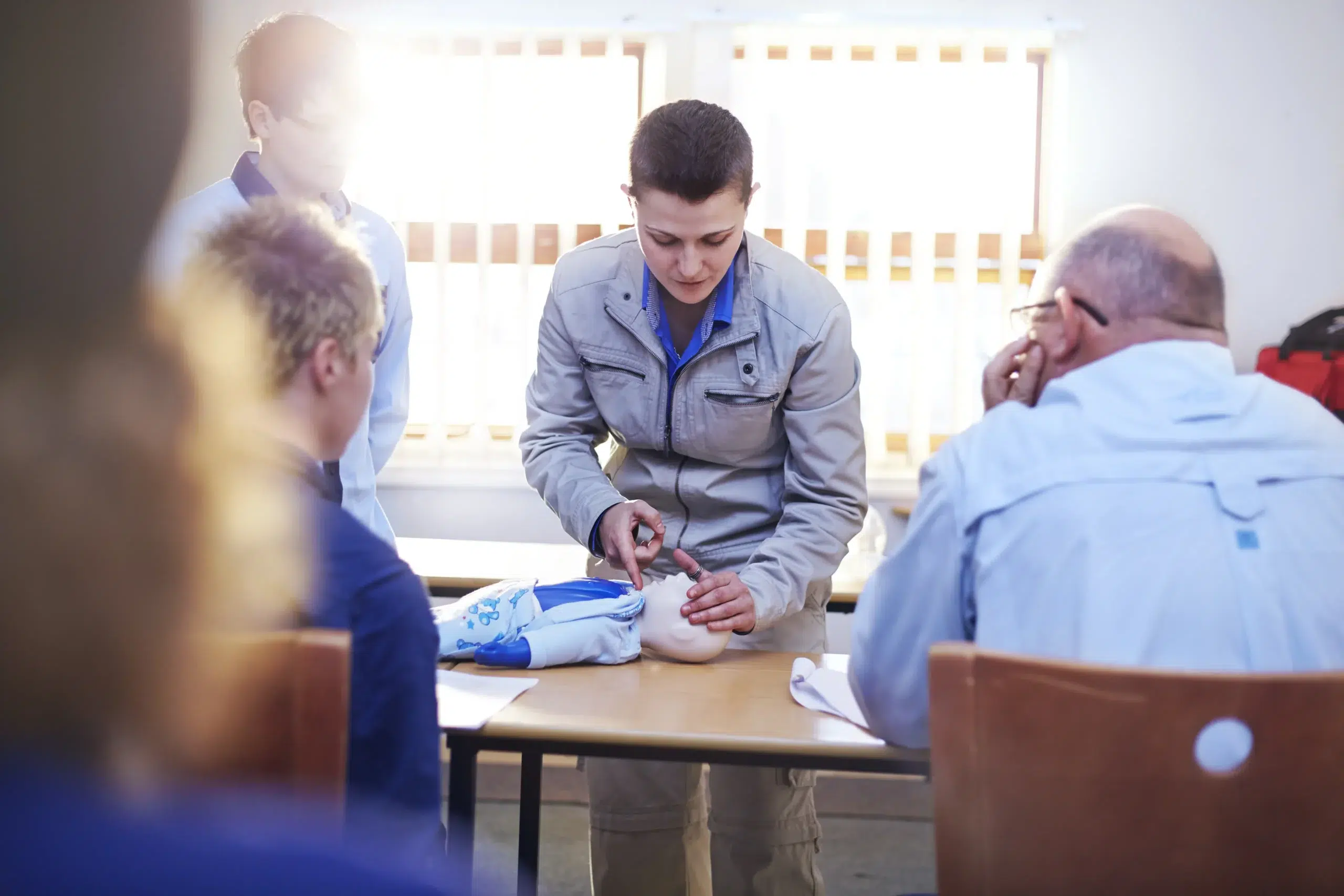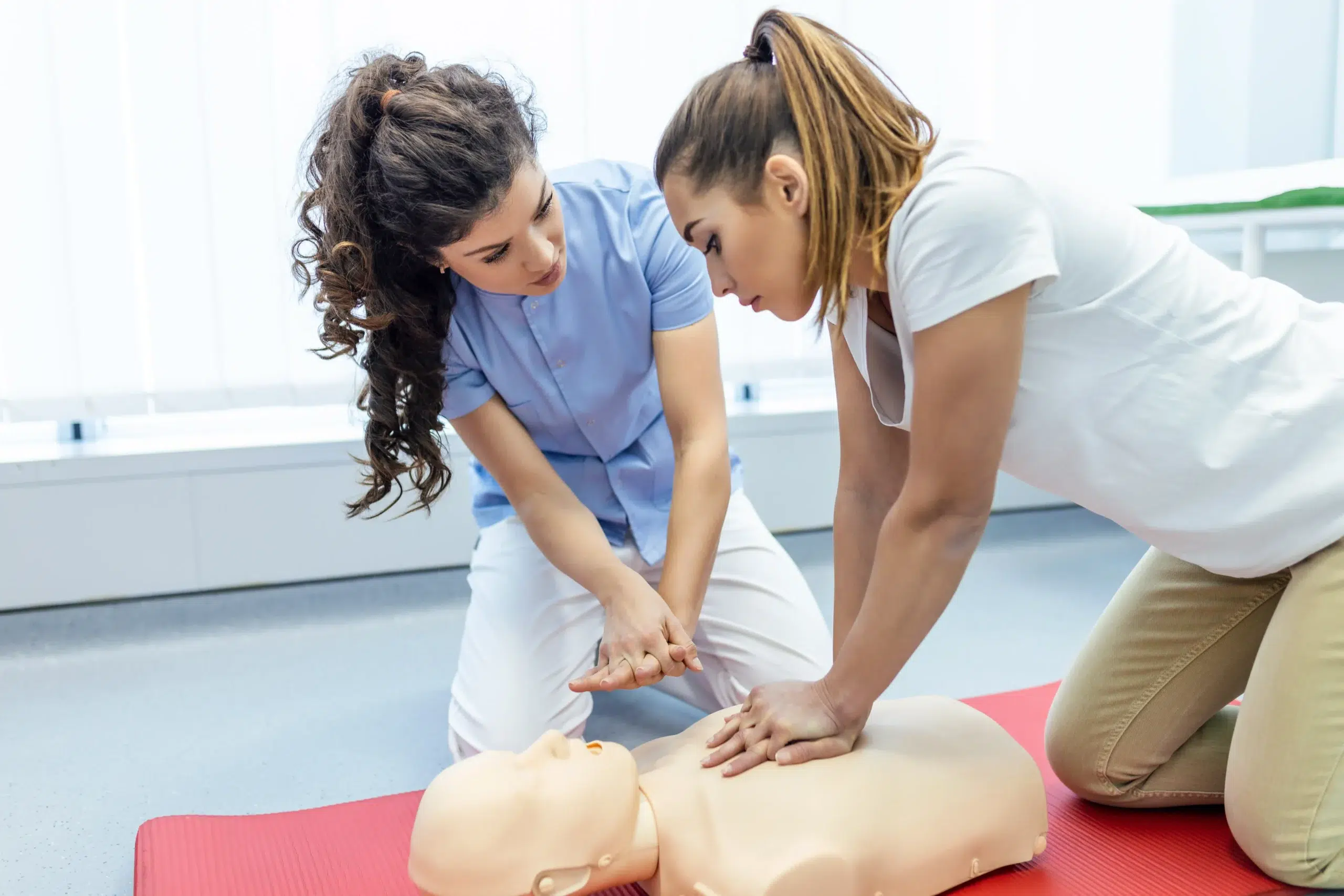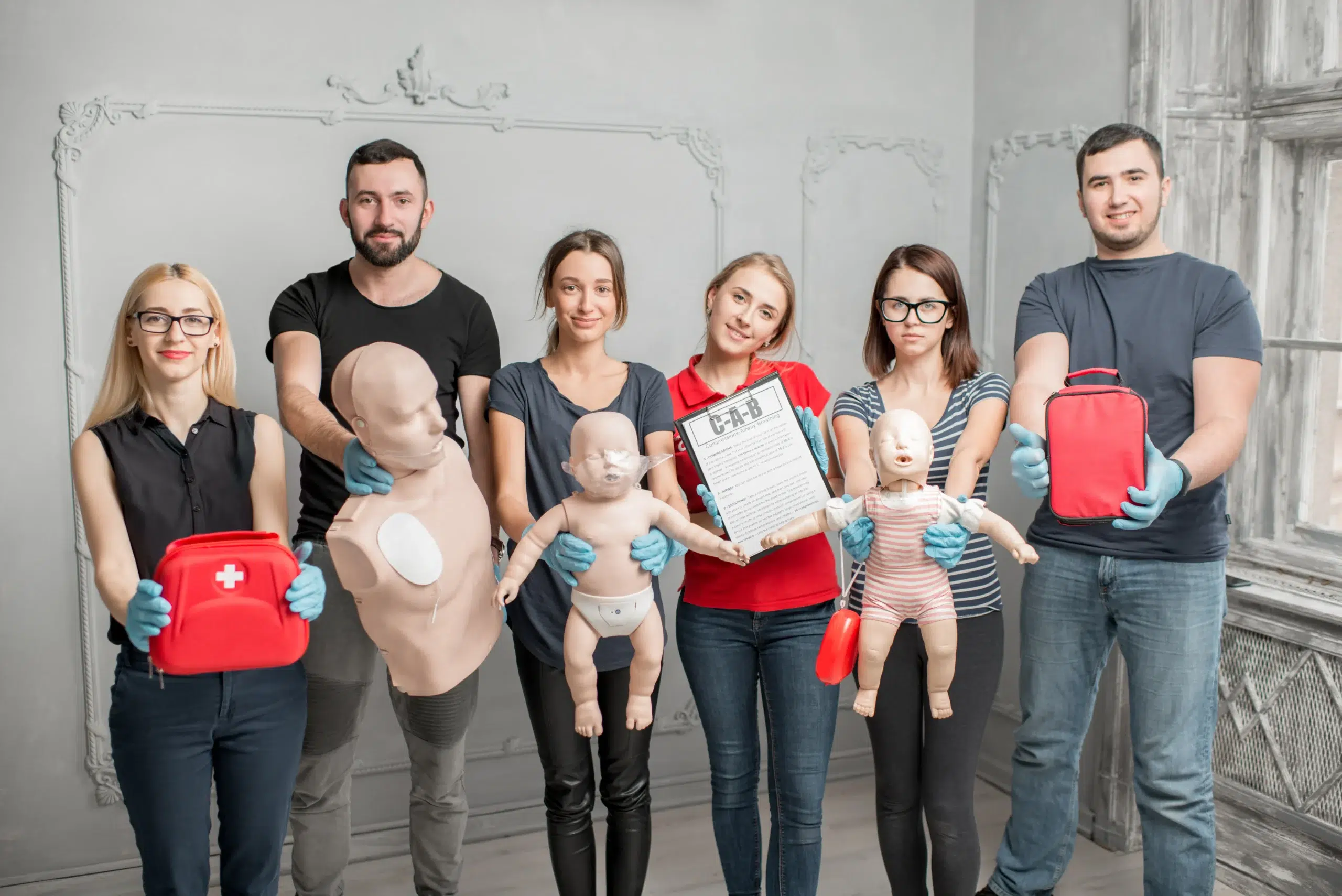Life throws curveballs. Being prepared for medical emergencies is empowering, and online CPR classes in Concord offer a flexible way to gain those lifesaving skills. This guide explores the world of online CPR training, covering everything from course structures and certification validity to the pros and cons of online versus in-person learning. We’ll also delve into cost considerations, available discounts, and how to choose the right online CPR class in Concord to fit your lifestyle and professional requirements. Get ready to feel confident and prepared to make a difference.
Key Takeaways
- Online CPR training fits your schedule: Learn lifesaving skills at your own pace and revisit material as needed, but confirm certification requirements for any in-person skills assessments.
- Pleasant Hill CPR Classes offers convenient, affordable training: Explore their range of AHA-certified courses, including BLS, ACLS, PALS, and RQI programs, designed for various professional needs.
- CPR skills empower you to act in emergencies: Whether for professional or personal reasons, CPR training provides the knowledge and confidence to respond effectively in critical situations.
What Are Online CPR Classes?
Online CPR classes offer a flexible way to learn lifesaving skills. Instead of attending a traditional in-person course, you complete the coursework digitally, often through interactive modules, videos, and quizzes. This format lets you learn at your own pace, making it a convenient option for busy individuals. You can study whenever and wherever works best for you, fitting the training around your existing commitments. This accessibility makes online CPR certification an attractive choice.
Benefits of Online CPR Training
Online CPR training offers several advantages. The self-paced structure allows you to revisit sections as needed and truly grasp the material. Many programs grant extended access, sometimes up to two years, providing ample opportunity to refresh your knowledge. This flexibility is a major benefit for those who prefer to learn in shorter bursts or need more time to absorb information. Plus, online courses are often broken down into digestible modules, so you can focus on specific topics and learn in the order you find most effective. For example, the American Red Cross structures its online CPR training this way. While online learning provides a strong knowledge base, many courses also require a hands-on skills assessment with a certified instructor to ensure you can perform CPR effectively. This blended learning approach combines the convenience of online study with essential practical training, often incorporating feedback from training mannequins to enhance learning, as highlighted in this study on the importance of feedback in CPR training.
Available Online CPR Courses
Several organizations offer online CPR certification courses. Pleasant Hill CPR Classes provides a range of American Heart Association (AHA) certified courses, including BLS, ACLS, PALS, CPR, and First Aid. For medical professionals seeking a streamlined certification process, their specialized RQI (Resuscitation Quality Improvement) programs offer an efficient path. When choosing a provider, ensure the certification aligns with your specific needs and is recognized by your employer or governing body. You can explore more options and compare what each program offers by visiting their websites and contacting them directly.
Top Concord Online CPR Class Providers
Finding the right CPR certification course can feel overwhelming. To help you, we’ve compiled a list of reputable CPR class providers in and around Concord. This list includes options for online, in-person, and blended learning formats.
Pleasant Hill CPR Classes
Pleasant Hill CPR Classes offers a range of American Heart Association (AHA) training courses, including BLS, ACLS, PALS, CPR and First Aid. They emphasize convenient daily classes, discounted group rates, and a low price guarantee. Their specialization in RQI programs makes them a practical choice for medical professionals seeking efficient RQI certification. While their physical location serves Pleasant Hill, Walnut Creek, and Concord, their online courses extend their reach. You can explore their BLS certification course details on their website.
CPR Training Center
CPR Training Center focuses on AHA-certified courses, including ACLS, BLS, PALS, and CPR renewals. They offer various learning formats, including online options, making them accessible to a broader audience. Their focus on Concord makes them a convenient option for local residents. Visit their website for more information on their courses and schedules.
Safety Training Seminars
Safety Training Seminars provides a variety of AHA courses, such as CPR, BLS, ACLS, and PALS. They also recognize the growing importance of RQI courses and often incorporate them into their programs. This makes them a solid option for healthcare providers looking to maintain and improve their resuscitation skills. Learn more about their courses and training centers on their website.
American Red Cross
The American Red Cross is a well-known provider of CPR classes and offers courses in various formats, including in-person, online, and blended learning. Their digital certificates offer easy access and verification. You can explore their CPR class options on their website.
How Online CPR Classes Certify You
Online CPR training offers flexibility, but how does the certification process work? Let’s break it down:
Course Structure and Duration
Online CPR classes typically use a self-paced structure, combining video lectures, interactive quizzes, and downloadable resources. This allows you to fit the training around your schedule. Organizations like the American Red Cross offer various learning formats, from fully online to blended learning (a mix of online and in-person sessions).
Certification Validity and Recognition
It’s crucial to understand that not all online CPR certifications are created equal. While convenient, some online-only CPR certifications may not meet requirements for certain jobs or regulatory bodies. Major organizations like the American Heart Association and the American Red Cross emphasize recognized training and don’t typically accept 100% online CPR certifications for healthcare providers. Always verify the certification’s validity before enrolling. For credible certifications accepted in various professional settings, consider providers like Pleasant Hill CPR Classes.
Hands-On Skills Assessment
Online courses excel at delivering theoretical knowledge, but CPR requires practical, hands-on skills. Effective CPR involves physical techniques like chest compressions and rescue breaths. While online modules can demonstrate these skills, they can’t replace the in-person practice and assessment required for most workplace certifications. This is why many prefer a blended learning approach, combining online learning with in-person skills sessions.
Blended Learning Options
Blended learning offers the best of both worlds. You complete the cognitive portion online at your own pace, then attend a shorter in-person session to practice and demonstrate your skills. This format, often preferred for certifications like ACLS HeartCode, provides a well-rounded learning experience, ensuring you’re both knowledgeable and proficient in CPR techniques. This approach helps guarantee you gain the practical experience necessary for a valid and recognized certification.
Online vs. In-Person CPR Training
Deciding between online and in-person CPR training is a common question. Both have their pros and cons, so understanding your needs and priorities is key to making the right choice. We’ll break down the advantages and disadvantages of each to help you decide which learning style best suits you.
Advantages of Online CPR Classes
Online CPR training offers flexibility that traditional in-person classes often can’t match. Busy schedules, family commitments, and geographical limitations can make attending a set class time difficult. With online learning, you can study at your own pace and revisit materials whenever you need a refresher. The American Red Cross highlights this benefit, emphasizing how online courses cater to busy individuals. Plus, some online platforms incorporate interactive elements like progress tracking and real-time feedback, enhancing the learning experience. This personalized approach can be a great way to solidify your understanding of the material.
Disadvantages of Online CPR Classes
While the flexibility of online CPR training is appealing, it’s essential to be aware of its limitations. The most significant drawback is the lack of hands-on practice with a certified instructor. As the American Red Cross explains, online-only courses typically don’t include the in-person skills assessment required by some workplaces. This can be a problem if your employer mandates hands-on training. Additionally, not all online CPR certifications are created equal. Some online-only certifications may not be accepted by employers, potentially leading to wasted time and money if you need to retake an in-person course. Do your research to ensure the online program you choose aligns with your workplace requirements.
Choose Online or In-Person Training
Ultimately, the best choice depends on your specific circumstances. If your workplace requires hands-on training and certification from a nationally recognized organization like the American Heart Association, then in-person training is the clear winner. Pleasant Hill CPR Classes offers a variety of in-person courses that meet these requirements. If your situation allows for more flexibility and you’re comfortable learning the basics online, then an online course might be a good starting point. However, always double-check with your employer or certifying body to ensure the online certification you choose will be accepted. If you’re unsure, reaching out to us directly through our contact page is always a good idea. We can help you determine the best path forward.
Compare Online CPR Class Costs in Concord
Shopping for online CPR classes can feel overwhelming with so many options. Understanding pricing factors helps you make informed decisions and find the best value.
Factors Affecting Pricing
Several factors contribute to the cost of online CPR classes. Location is key, as providers often adjust pricing based on the local market. For example, courses offered across many cities may have different price points. The type of certification also matters. AHA certification cards are valid for two years, and this can influence the cost. The course format itself plays a role, too. Some providers offer blended learning, combining online modules with in-person skills sessions, which can impact the total cost. Safety Training Seminars offers courses in over 60 cities, highlighting how location influences pricing.
Pleasant Hill CPR Classes’ Low Price Guarantee
Pleasant Hill CPR Classes prioritizes affordable training. They offer a low-price guarantee, claiming the lowest prices in Contra Costa County. As a woman-owned AHA Training Center, they focus on high-quality instruction and convenient scheduling. They offer AHA-certified courses seven days a week in Pleasant Hill and surrounding areas, making scheduling easier. They’ll match any lower price for the same course. This commitment to affordability makes them a strong option when comparing costs.
Value for Your Money
Look beyond the price tag and consider the overall value. For medical professionals, the American Heart Association RQI program offers an efficient path to BLS, ACLS, and PALS certification. RQI courses are known for their flexible, self-paced format, and their availability is increasing. This makes maintaining certifications and integrating continuous learning easier. While cost matters, choosing a program that fits your learning style and professional needs ultimately provides the best value. Pleasant Hill CPR Classes specializes in RQI training, offering a valuable option for healthcare providers.
Find Discounts and Promotions
Saving money on essential training like CPR is always welcome. Many CPR training providers offer various discounts and promotions to make these lifesaving skills more accessible. Knowing where to look can help you get the best value.
Group Discounts
If you’re coordinating training for a group, like your workplace, school, or community organization, explore group discounts. Many CPR training centers, including Pleasant Hill CPR Classes, offer reduced rates for group bookings. This can significantly lower the per-person cost, making it easier to train your entire team. Contact providers directly to discuss your group’s needs and their discount policies.
Package Deals
Some CPR training providers offer package deals that bundle multiple courses or certifications. For example, you might find a package combining CPR, First Aid, and AED training at a discounted price. Pleasant Hill CPR Classes offers various courses, so see if they have package options that fit your needs. This is a smart way to gain comprehensive knowledge and multiple certifications while saving money.
Seasonal Promotions
Check for seasonal promotions or special offers throughout the year. Some providers may offer discounts during certain months or tie promotions to specific events. Keep an eye on training centers’ websites and social media, like Pleasant Hill CPR Classes, to stay informed about potential savings. You might find a great deal that makes your CPR training even more affordable.
Debunking Online CPR Class Myths
Let’s clear up some common misconceptions about online CPR classes. It’s important to separate fact from fiction so you can make an informed decision about your training.
Is Online Learning Effective?
Absolutely! Online CPR training has come a long way. Modern platforms offer a tailored learning experience with real-time feedback and progress tracking, similar to having a personal instructor. This personalized approach helps you grasp the concepts and techniques effectively. Research shows that combining online learning with enhanced feedback tools significantly improves CPR performance.
Do Employers Accept Online Certification?
This is where it gets a little tricky. While many online-only CPR certifications exist, not all are created equal. It’s crucial to choose a program accepted by major organizations like the American Heart Association. Many employers and regulatory bodies require certification from these established organizations. If you’re unsure, it’s always best to check directly with your employer or the relevant certifying body to confirm their requirements. Pleasant Hill CPR Classes offers American Heart Association-compliant courses, ensuring your certification meets workplace standards. You can explore our AHA BLS course for more information.
Skill Acquisition and Retention
One common concern about online learning is whether it truly allows for skill acquisition and retention. The good news is that studies show online CPR training, particularly when combined with hands-on practice, can be very effective. Research indicates that using audiovisual feedback and performance review tools improves both the quality of CPR skills and long-term retention. This means you’ll not only learn the techniques effectively but also be more likely to remember them when it matters most. Pleasant Hill CPR Classes emphasizes this blended learning approach, combining online instruction with in-person skills sessions to ensure you develop and retain the necessary skills. Learn more about our RQI program, which offers an efficient certification process for medical professionals.
Choose the Right Online CPR Class
Finding the right online CPR class depends on your specific needs and goals. Whether you’re a healthcare provider, an educator, or simply someone who wants to be prepared for emergencies, understanding the nuances of different online CPR courses is essential.
Healthcare Professionals
For healthcare professionals, CPR training goes beyond the basics. It’s about mastering advanced life support techniques and maintaining proficiency in high-stress environments. Look for online CPR courses that align with the American Heart Association guidelines, such as those for BLS, ACLS, and PALS. As MedTrainer points out, this training is crucial for managing stress during emergencies and delivering effective care under pressure. Consider programs like RQI that offer streamlined recertification and skills maintenance.
Educators and Childcare Providers
Educators and childcare providers have a unique responsibility to ensure the safety and well-being of the children in their care. Choosing an online CPR class that emphasizes pediatric CPR and first aid is essential. These courses should cover age-specific techniques and best practices for responding to emergencies involving infants and children. The ability to perform CPR quickly and confidently is paramount in these situations, as highlighted by CPR AED Course in their discussion of CPR importance.
Workplace Safety
Many workplaces require or encourage employees to obtain CPR certification. Online CPR training offers a convenient and flexible way for businesses to meet these requirements and empower their staff with life-saving skills. HSI emphasizes the importance of hands-on practice and realistic scenarios in their CPR training resources, so look for online courses that incorporate these elements. Consider blended learning options that combine online instruction with in-person skills sessions for a comprehensive learning experience.
General Public and Parents
Even if CPR certification isn’t required for your job, learning CPR can be invaluable. It equips you to respond effectively in emergencies and potentially save a life. The Red Cross highlights the diverse range of careers where CPR certification is beneficial, from healthcare and caregiving to office work and more. For parents, knowing CPR can provide peace of mind and the ability to act quickly if a child or family member experiences a medical emergency. Look for basic online CPR and first-aid courses designed for the general public, focusing on essential skills and knowledge.
Prepare for Your Online CPR Class
Getting ready for your online CPR class is easy. A little prep work goes a long way toward a smooth and successful learning experience. Here’s what you should do:
Technical Requirements
Online CPR classes offer flexibility and convenience. Before you begin, ensure you have a reliable internet connection and a computer or tablet with sound and video capabilities. Some platforms may require specific software or browser plugins, so check the course requirements beforehand. Pleasant Hill CPR Classes provides clear instructions to help you get set up quickly. Testing your setup in advance can prevent last-minute technical hiccups.
Study Materials and Resources
Many online CPR courses provide digital study materials. You might receive access to ebooks, videos, and interactive modules. For example, the American Heart Association’s HeartCode ACLS program uses a blended learning approach, combining online coursework with in-person skills practice. Download any necessary materials before your class starts so you can easily follow along. Pleasant Hill CPR Classes offers a variety of AHA courses, including CPR, BLS, ACLS, and PALS. Consider exploring their RQI classes as well.
Manage Your Time
While online classes offer flexibility, setting aside dedicated study time is crucial. Treat your online CPR class like any other important appointment. Find a quiet space where you can focus without interruptions. Breaking down the coursework into smaller, manageable chunks can make learning more effective. Many online platforms offer real-time feedback and progress tracking, which can help you stay motivated and monitor your understanding. Studies have shown that video feedback and detailed device feedback improve CPR performance and skill acquisition. By managing your time effectively and using available resources, you’ll be well-prepared to master the material and gain confidence in your CPR skills. Don’t forget to check out Pleasant Hill CPR Classes’ low price guarantee.
Why CPR Training Matters
CPR training matters because it empowers you to make a real difference in life-or-death situations. It’s about more than just ticking a box for work or school—it’s about equipping yourself with the skills and confidence to potentially save a life. Whether you’re a healthcare professional, a teacher, a parent, or simply someone who wants to be prepared, understanding the value of CPR training is crucial.
Improve Emergency Response
CPR training equips you with the skills to respond effectively during emergencies. In a crisis, seconds count. CPR training teaches you to stay calm and focused under pressure, allowing you to quickly assess the situation and provide immediate assistance. This is especially important for healthcare providers who regularly face high-stress situations. Knowing exactly what to do can dramatically increase the chances of survival for someone experiencing cardiac arrest.
Ensure Legal and Workplace Safety
Many workplaces require CPR certification for legal and safety reasons. Providing CPR training not only protects your employees but also demonstrates your commitment to a safe work environment. Having trained staff on hand can minimize risks and create a culture of preparedness. This can be particularly important in industries like construction, childcare, and fitness. Contact Pleasant Hill CPR classes to learn more about training options for your workplace.
Build Confidence in Crises
CPR training doesn’t just teach you the techniques; it builds your confidence to use them. Knowing you have the skills to handle a medical emergency can empower you to act decisively when every second counts. This confidence can translate to other areas of your life as well, helping you feel more prepared to handle unexpected challenges. Pleasant Hill CPR Classes emphasize building this confidence through hands-on practice and supportive instruction.
Improve Team Coordination and Communication
In healthcare settings, effective CPR often requires a team effort. Proper CPR training enhances team coordination and communication, ensuring everyone works together seamlessly during critical moments. Clear communication and a shared understanding of procedures are essential for providing the best possible care and improving patient outcomes. Explore the RQI programs offered by Pleasant Hill CPR Classes to see how team training can elevate your skills.
Related Articles
- Online CPR Classes in Walnut Creek: Your Complete Guide
- CPR Certification in Pleasant Hill: Your Complete Guide
- CPR Certification in Concord: Your Guide – Pleasant Hill CPR Classes
- Advanced Cardiac Life Support (ACLS) Training in Concord – Pleasant Hill CPR Classes
- Online BLS Classes in Walnut Creek: Your Complete Guide – Pleasant Hill CPR Classes
Frequently Asked Questions
Are online CPR certifications accepted everywhere?
While online CPR courses offer a convenient way to learn the material, it’s important to know that not all certifications are universally accepted. Some employers and organizations require in-person skills assessment as part of their certification process. Always check with your employer or the relevant regulatory body to confirm their specific requirements before enrolling in an online course. Many online programs offer a blended learning approach, combining online coursework with an in-person skills session to meet these needs.
How long does online CPR certification last?
Similar to traditional in-person CPR certification, online certifications are typically valid for two years. It’s essential to renew your certification before it expires to maintain your skills and credentials. Many providers offer refresher courses or streamlined renewal options to make this process easier.
What if I don’t have a lot of experience with online learning?
Online CPR courses are designed to be user-friendly, even for those new to online learning. Most platforms offer intuitive navigation, clear instructions, and technical support if needed. The self-paced nature of online learning allows you to take your time and review materials as often as necessary. Plus, many courses incorporate interactive elements and practice quizzes to reinforce learning and keep you engaged.
What’s the difference between CPR and BLS certification?
While the terms are often used interchangeably, there’s a key distinction. CPR focuses on the core techniques of chest compressions and rescue breaths for anyone experiencing cardiac arrest. BLS (Basic Life Support) certification encompasses a broader range of skills, including CPR, AED use, and basic airway management. BLS certification is often preferred, especially for healthcare providers and those working in professional settings.
How can I find affordable online CPR classes?
CPR training doesn’t have to be expensive. Many providers offer discounts, such as group rates or seasonal promotions. Comparing prices from different providers and checking for special offers can help you find the best value. Some organizations also offer financial assistance programs or scholarships to make training more accessible. Don’t hesitate to contact training centers directly to inquire about available discounts or payment plans.
